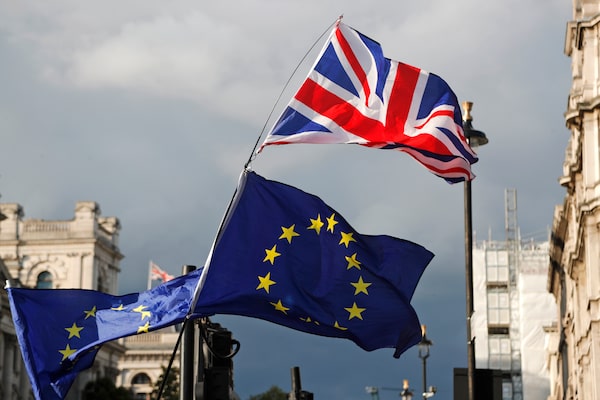
Britain is set to leave the EU on Oct. 31, although Parliament recently passed a law requiring Prime Minister Boris Johnson to seek a three-month extension if he hasn’t reached an agreement by Oct. 19.Frank Augstein/The Associated Press
Brexit talks between Britain and the European Union are on the verge of collapse, with the two sides trading blame only weeks before the U.K. is set to leave the bloc.
The talks hit a roadblock Tuesday when British Prime Minister Boris Johnson spoke with German Chancellor Angela Merkel. According to British officials, Ms. Merkel objected to Mr. Johnson’s proposals and “made clear a deal is overwhelmingly unlikely.” The officials added that if Ms. Merkel’s concerns “represent a new established position, then it means a deal is essentially impossible, not just now but ever.” A spokesman for Ms. Merkel declined to comment, but European Council President Donald Tusk accused Britain of engaging in a “stupid blame game.”
The breakdown in negotiations comes at a critical moment. Both sides have indicated that unless the framework of a deal is in place by the end of this week, the talks would end. Britain is set to leave the EU on Oct. 31, although Parliament recently passed a law requiring Mr. Johnson to seek a three-month extension if he hasn’t reached an agreement by Oct. 19. However, the Prime Minister has said repeatedly that he will find a way around the law and won’t seek an extension.
On Tuesday Mr. Johnson’s office and several cabinet ministers blamed the EU for the impasse, suggesting the bloc wasn’t serious about negotiating or giving ground. “We in this government have compromised,” Deputy Prime Minister Michael Gove told the House of Commons. "We have moved. It is now time for the EU to move too.”
But EU officials said Mr. Johnson’s proposals failed to address some of the bloc’s long-held concerns. “Boris Johnson, what’s at stake is not winning some stupid blame game,” Mr. Tusk tweeted. "At stake is the future of Europe and the UK as well as the security and interests of our people. You don’t want a deal, you don’t want an extension, you don’t want to revoke, quo vadis [where are you going]?”
German MP Norbert Rottgen, who chairs the Bundestag’s foreign affairs committee, added on Twitter: “Frankly a deal on the basis of Johnson’s proposal … has been unrealistic from the beginning and yet the EU has been willing to engage. Blaming others for the current situation is not fair play!”
The main concern for the EU is Mr. Johnson’s proposal to pull the entire United Kingdom, including Northern Ireland, out of the bloc’s customs union, which allows for the tariff-free movement of goods among members but requires them to set the same external duties. The EU has balked at the idea because it would mean customs checks along the Irish border, something the EU and Ireland believe violates the 1998 Good Friday Agreement, which ended decades of sectarian violence and guaranteed an open border. The EU has insisted that Northern Ireland must remain in the customs union to ensure the border stays open. Mr. Johnson wants the entire country out so the U.K. can set its own tariffs and trade policy. Both sides indicated Tuesday that talks will continue, but it’s unclear how the impasse can be overcome.
As the discussions dragged on there was more evidence the prolonged Brexit debate is having a detrimental impact on the British economy. Figures released Tuesday by the Office for National Statistics showed that productivity – which measures economic output per hour worked – fell at the fastest annual pace in five years in the third quarter of 2019. And that came after zero growth in each of the previous two quarters. “These figures hammer home the impact uncertainty is having on the business environment,” said Tej Parikh, chief economist at the Institute of Directors.
Compounding the woes for business, the Treasury Department released a report Tuesday that said companies will have to file an additional 215 million customs declarations annually once the U.K. leaves the EU. And the cost of filing those declarations will be £7.5-billion, the report said. The figure represents “the administrative burden of completing customs declarations for all EU trade in goods movements.”
Our Morning Update and Evening Update newsletters are written by Globe editors, giving you a concise summary of the day’s most important headlines. Sign up today.
 Paul Waldie
Paul Waldie